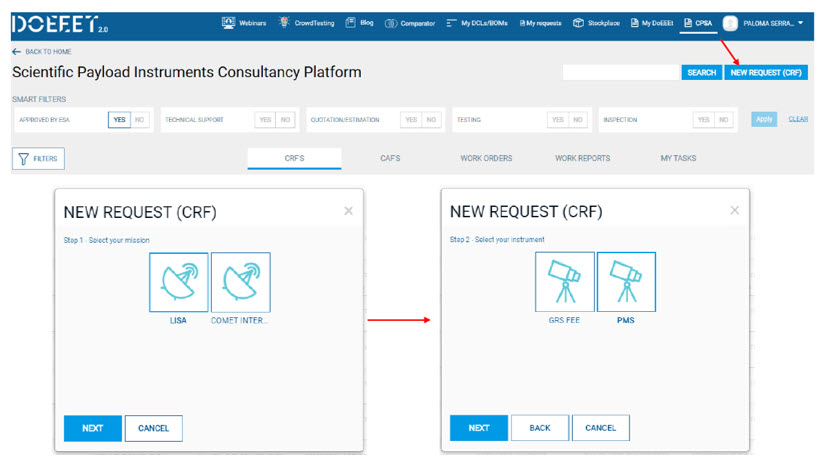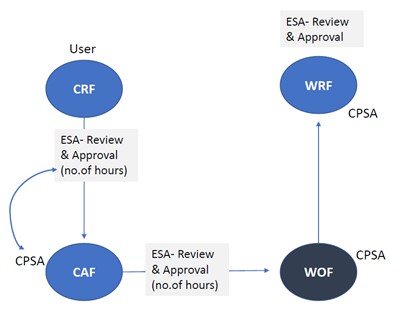CPSA – Scientific Payload Instruments Consultancy Platform
- Posted by Paloma Serrano
- On November 3, 2020
- 0
The CPSA is a project supported by Alter Technology to provide Consultancy services related to EEE parts during the early phase of space missions covered by the ESA Science Programme. At this stage, the definition of technical aspects and requirements for the different instruments is still taking place, and it is the best moment for EEE part selection and assessment according to mission requirements.
The main aims of the CPSA are: 1) to anticipate potential issues that could lead to problems if spotted in later phases, and therefore 2) to prevent/reduce the risk derived from these problems in the procurement phase when any issue can impact the timeline, cost, scope, or quality of the instruments; 3) To spot recurrent requests that may evidence emerging needs in the industry of EEE parts.
For that purpose, ATN has developed a virtual platform powered by doEEEt.com for optimal communication between the users, ESA and the CPSA team at ATN. As a result, four virtual dialogue forms have been designed for a fluent exchange of information and results. The users can create a consultation form (CRF- consultation request form) to be reviewed and approved by ESA, and the CPSA at ATN will answer this consultation with a proposal or CAF (Consultation Answer Form). After ESA’s approval, the proposed activities or consultation services will be performed at ATN to provide the corresponding outcome that will result in preventing future potential problems. This outcome may include the evaluation of new technologies/ components/ COTS, or the results from specific testing activities (such as radiation, and cryogenic tests) that will ensure the accomplishment of the corresponding mission requirements.
Why is the CPSA needed?
Space scientific missions are projects with a high level of complexity and several phases of development. The phases are sets of activities aimed for an objective and closed with a review. If the review is considered successful by the corresponding authorities, the next phase can start. This division also allows the detection of potential critical issues, as well as the detailed definition of the mission technical requirements. For the successful conclusion of every phase, the top-level customer and the sponsor need assistance from several partners, such as the prime contractor and companies that design solutions to successfully complete the mission.
The complexity of the projects and the number of research entities involved has dramatically increased over the last decades. These entities are noticeably skilled in designing solutions to achieve the project goals, but often not so aware of the time scales and the product assurance requirements. This lack of expertise in space project requirements can severely impact the project timeline. The associated risk can be mitigated if the different users have the possibility to request a preliminary consultation and obtain efficient feedback during the very first stages of design development.
An entity that has proven its added value throughout almost every ESA scientific mission is the CPPA (Coordinated Parts Procurement Agency). The CPPA activities usually begin at the end of phase B and these activities include but are not limited to, the processing of parts lists, consolidated parts procurement, identification of critical parts, parts evaluation, procurement technical support and NCR management. During the execution of the CPPA activities, ATN has identified the need to support users in earlier phases of the project with the analysis and selection of parts to be used in the core of their designs. An inadequate selection may jeopardize the ability to meet the project baselines in terms of scope, timeline and budget at a later phase. The strong technical background required at this early phase consultancy task is one of ATN’s major strengths, that can prove a broad experience working with users and customers under this approach for many years.
The introduction of the CPSA in early phases of the projects, when the definition of different aspects and requirements is taking place, will 1) help to anticipate the potential problems and 2) prevent from problems in later phases, where changes could have a more severe impact on the project, and 3) help to spot emerging needs in the industry of EEE parts.
Who are the CPSA users?
The CPSA will provide Consultancy services for the instrument users of projects covered by the ESA Science Programme during their early phases. Although the list includes missions such as LISA, Comet Interceptor, SMILE, Athena, ARIEL, Envision, SPICA, Theseus or IceGiants, it is not limited to those projects but could be extended to others projects, as needed or requested.

Image credits: ESA ‘Cosmic Vision’
How does the CPSA platform work?
To access the platform, users must register first at doEEEt.com. The platform is structured in four basic virtual dialogue forms:
- CRF: Consultation Request Form. Created by the instrument users and reviewed and approved by ESA. Contains the consultation with the question or concern to be addressed or investigated.
- CAF: Consultation Answer Form. Created by the CPSA team at ATN and reviewed and approved by ESA. Contains the proposal of the work to be performed to address a certain CRF.
- WOF: Work Order Form. This form is intended for financial purposes and only visible to ATN and ESA.
- WRF: Work Report Form. Created by the CPSA and reviewed and approved by ESA. Contains the work performed, the outcome and the consequences for the science payload instrument team, together with the corresponding test reports, when applicable.
These four dialogue forms have been designed to achieve a fluent communication between the instrument users, ESA and the CPSA team at ATN. It features an email-notification system to keep everyone involved in a certain consultation informed and up-to-date. It also allows the precise control of the documents and tasks, displaying several filtering options to browse for specific consultations.
- CPSA – Scientific Payload Instruments Consultancy Platform - November 3, 2020
- The Purchasing Process of EEE Parts – Key Factors for Success - June 1, 2020




0 comments on CPSA – Scientific Payload Instruments Consultancy Platform